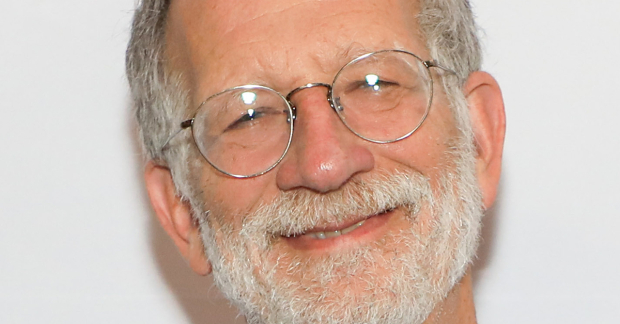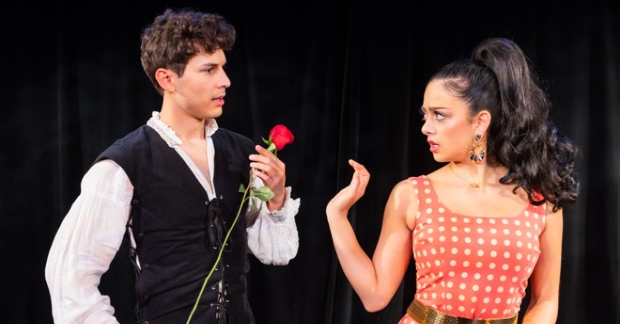Interview: Mark Saltzman on Creating Romeo and Bernadette and the Holiday Classic Mrs. Santa Claus
Seven-time Emmy-winner Saltzman tells us about his off-Broadway musical at Theatre 555.
One of the just-pre-pandemic off-Broadway hits was Mark Saltzman's Romeo & Bernadette: A Musical Tale of Verona and Brooklyn, a Brooklynese, comedic retelling of the Shakespearean tragedy using classic Italian melodies. It's a personal piece for Saltzman, a seven-time Emmy-winning Sesame Street writer who, for that show, created indelible characters like Placido Flamingo, penned lyrics for tunes like "I've Got a New Way to Walk," and, reportedly, used his relationship with late partner Arnold Glassman as the inspiration for his Bert and Ernie scenes.
Glassman had just passed away when Romeo and Bernadette first took the stage in 2003, and returning to it two decades later has been raw but satisfying. Here, he tells us about the new off-Broadway production, running at Theatre 555 through June 26, and gives us an origin story on one of his other classic projects, the 1990s TV movie Mrs. Santa Claus, starring Angela Lansbury and featuring a Jerry Herman score.

(© Tricia Baron)
How did you come to say "I want to write a Godfather-style Romeo and Juliet?"
Pretend to be at the end of the last century. I've always loved the Godfather movies. I'm addicted to The Offer right now. So I was thinking of a Romeo and Juliet with mafia families. There were Five Families, what if two of those families [were the Montagues and Capulets]?
This is a full-on comedy. People shouldn't go in expecting the original ending, should they?
One of the things often said about Romeo and Juliet is that it's an early tragedy that starts as a comedy. The set up is a comedy: Boy and Girl meet and their families don't want them to marry. Mercutio is a comic figure, constantly making dirty jokes. It's when Mercutio dies that it takes the path to tragedy. But what if Mercutio didn't die? What if he was just scratched? Then it becomes a comedy, because they get married in the end. That was really it – just uniting those two things: Shakespeare comedy and The Godfather.
So it was at Paper Mill in 2003.
I say that coming from New Jersey to New York even at rush hour doesn't take this long. It went to sleep for a while. I met Justin Ross here in L.A., and he looked over my work and said "Well, I'm from Brooklyn," so I think I would ike R&B. I was happy to go back to it, but…do you know about thee whole thing with my late partner, Arnold Glassman?
No.
He was my Brooklyn guy. When I first wrote this, it was for him. And he died of cancer just before the Paper Mill opening night. We had played the Coconut Grove in Miami, so he did get to see it. One of the oddest days of my life was his funeral and the opening at Paper Mill being the same day. There I was, trying to write letters to the cast and a eulogy, and wondering if it was ethical to use the same jokes in both.
After that, I folded it up and put it in the drawer, because it was hard. And then Justin Ross [the current director] came along and wanted to give it a try. It had some raw memories, but we took it to the Wyoming Theatre Festival and we gave it a shot. Then we did a workshop in New York with Eric Krebs producing, and then the plague struck.

(© Russ Rowland)
Why did you choose to use classical Italian melodies instead of writing a new score?
I love this music so much, and, you know, if I wrote the music, or really any composer, it would just be a knockoff. Most of these songs are easy to get the rights to, or are in the public domain. Also, in the early 60s, when this is set, there was this minor trend in pop music, these Italian songs with new lyrics became American pop hits. Elvis sang "It's Now or Never," which was really "O Sole Mio." I thought it would be great to listen to this music all day long in rehearsal, and it was great to listen to Enrico Caruso sing all these songs. It was from the love of this music in its original form, and the idea of sharing it.
I want to ask you a question about Mrs. Santa Claus, which is a movie I was raised on, and didn't know you wrote it until I started working on this piece. I've always wondered how that project came to be, and whether it was you or Jerry Herman or Angela Lansbury that instigated it.
Jerry initiated it by letting it be known that he wanted to write a TV musical in the order of Rodgers and Hammerstein's Cinderella. But Angela also had an incredible situation at CBS at the time, including deals for TV movies. She wasn't involved from the first, though. I was basically set up on a date with Jerry at a deli.
Where else do these Christmas specials happen for Jews?
Exactly. These Christmas specials happen over corned beef. Knowing his association with Angela, I said I'd love to do Mrs. Santa Claus with Angela Lansbury and he loved it instantly and got her on the phone the following day. One thing was, we wanted it to be current, which means it's set in the past. If you think of Jerry's stuff, a lot of it is set in the past, but he hadn't done the Edwardian era. To my amazement, what I wanted to do about women's suffrage and unionism, the network liked! I didn't think I'd get away with it because it was too progressive. But one of the things that was hammered into us at Sesame Street was that you always have to teach something. There always has to be an educational goal. So maybe when you first watched it, you didn't know about women's suffrage, but it was a good way to find out.
It always surprised me that it was never – well not never, because I don't know as fact – that it never became a stage show?.
I can't reveal too much, but let me say that you may yet see that. It's been a slow, slow process. There's a lot of corporate entities. It's much easier to just sit down and write a show. But I've been encouraging it and saying "Yes," because why is it always A Christmas Carol?









